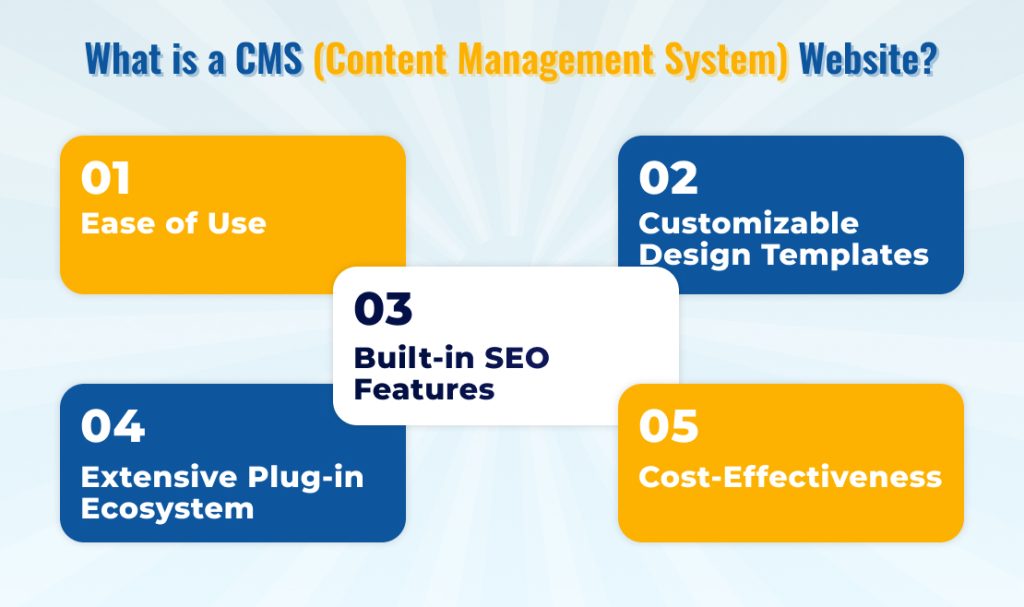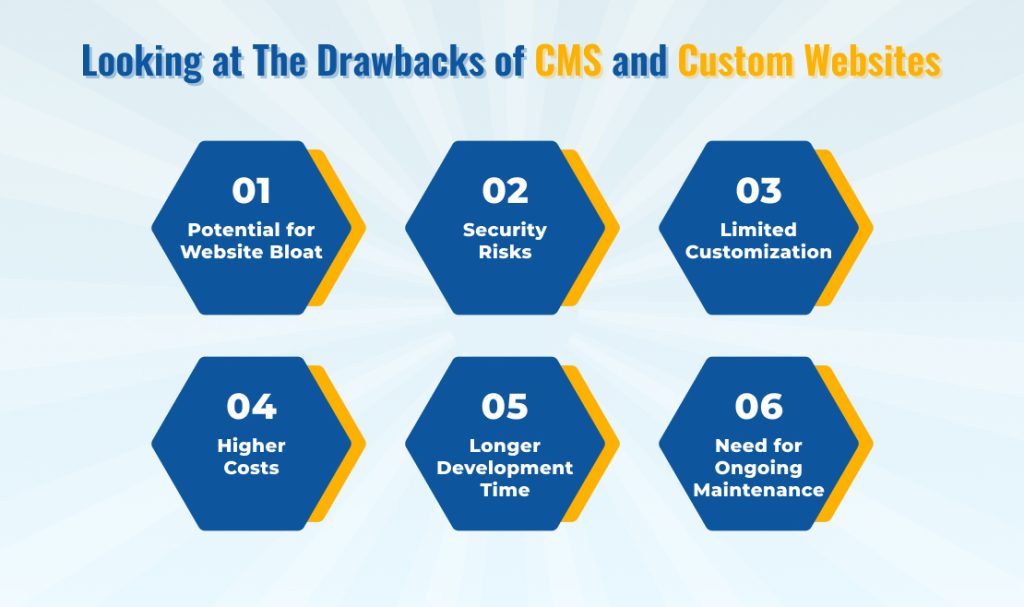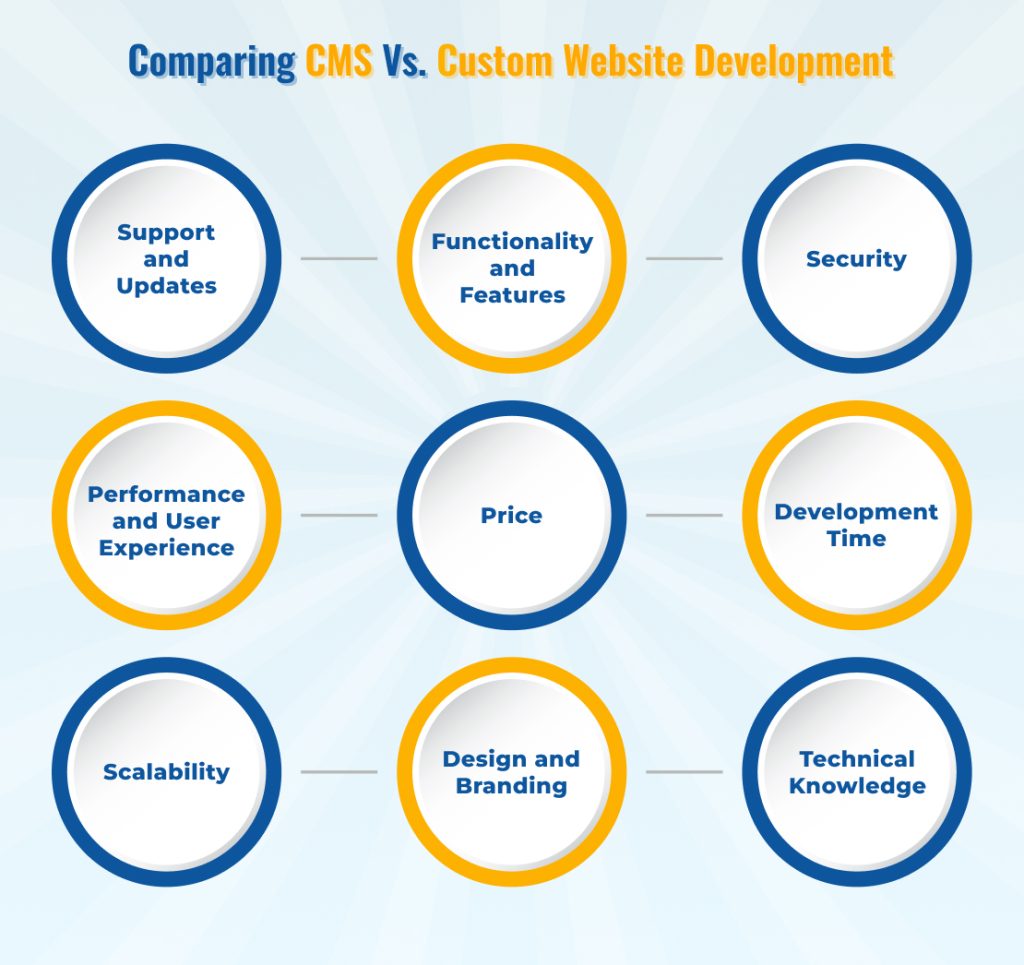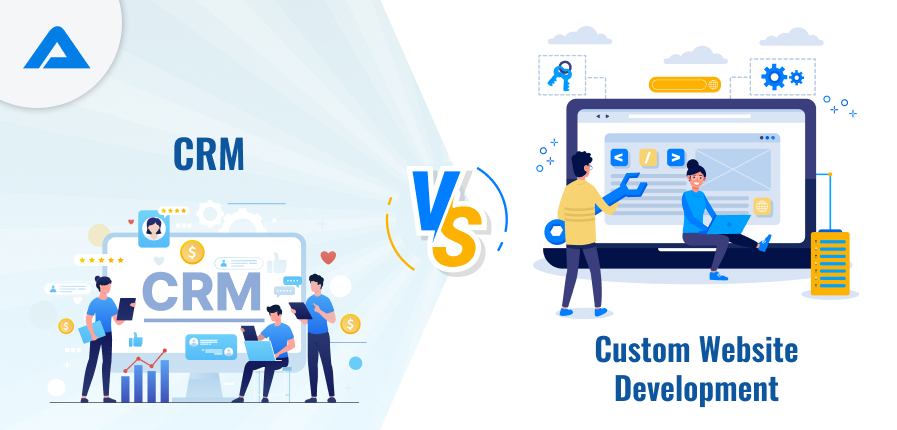This is a typical problem when you begin any new web-based project. What should I choose for the right Content Management System (CMS)? Should I create a custom web-based application? This is a valid decision for any technical or non-technical individual since each choice has pros and disadvantages based on the circumstances. It is essential to take the decision seriously and not think that a certain technology is right without considering the obvious.
If you’re beginning a new company, you may wonder whether you should opt for a CMS web creation (like WordPress) or consider making custom websites by hand. The decision is crucial since it will affect how your company appears online. It’s similar to choosing the perfect dress for a major occasion!
The choice depends on factors like the amount you’re willing to spend, the features your business requires, and what you’d like to see soon. Whether you’re a technical expert or not, it’s appropriate to contemplate whether you should use a pre-made CMS or build your site.
Both choices have positive and negative aspects. The best option for you will depend on what your company is concerned with. Don’t make a hasty decision. Be patient and take your time deciding. Don’t assume that there’s only one option that’s the most effective. It’s similar to choosing between various flavors of ice cream—you’ll want to pick the one that’s perfect for you!
CMS vs Custom Development: Metrics to Compare
Before we move on to the specific metrics of comparison, let’s define CMS. CMS is a term used to describe a content management system. It’s an application that allows you to upload and modify your website’s content rapidly and also connects to customer relationship management (CRM), points of sale (POS) analytics, point of sale (POS) marketing, and other tools.
The great thing about CMS is that it lets you utilize pre-built templates for adding new services, products, blogs, banners, pages, or other sections instead of creating everything completely from scratch. So long as you’re content with your website theme and everything is configured correctly, non-technical people on your team can publish content independently.
WordPress, Drupal, Joomla, Squarespace, Wix, and many more are examples of pre-built CMS. Their primary goal is to streamline content management, but you can expand their capabilities by incorporating e-commerce plug-ins. The support for e-commerce functions varies with each CMS.
Shopify, Magento, and BigCommerce are some examples of e-commerce platforms. An ecommerce platform is software specifically designed to meet the needs of both buyers and sellers, including transaction reviews, product tracking, returns, and so on. Modern e-commerce platforms have built-in CMS capabilities, at least to a certain point, and are often referred to as eCommerce CMSs.
This is why there’s a connection between e-commerce platforms and so-called blogging CMSs.
However, the majority of them are available off-the-shelf solutions. However, you can build your own CMS that fits your requirements perfectly. What is the best option for you to choose between Shopify and a custom-built website? Perhaps you should go more towards open source. Then, would you be able to evaluate WordPress against a custom CMS?
What is a CMS (Content Management System) Website?

The CMS (or Content Management System) enables users to create, manage, and change the content on their websites quickly without needing extensive technical expertise or coding skills.
It has an intuitive user interface, typically equipped with a visual editor, which allows users to easily design and organize websites, create content, publish them, and control various aspects of their websites, like layout, design, and multimedia components. Some of the most well-known CMS platforms include WordPress, Joomla, Drupal, and many more.
Benefits of CMS Website
CMS websites provide a variety of advantages that make it easier to manage websites as well as customization and optimization. Here are a few:
Ease of Use
CMS-based websites make it easy for users to update, create, and publish content on their sites. They do this by offering an easy-to-use interface and user-friendly tools for managing content. As CMS platforms are user-friendly, no technical skills are needed to code, allowing users to manage their sites without the help of developers or other tech experts.
Customizable Design Templates
CMS platforms offer a wide range of templates and designs from which users can choose to create visually pleasing websites. They provide flexibility in design and do not require a large amount of design or coding expertise since they can be modified to match the branding and style preferences of the site’s owner.
Built-in SEO Features
CMS platforms typically include Search Engine Optimization (SEO) plug-ins or tools that help users boost their website’s visibility in search results. These features aid users in improving their website’s visibility in search engines and organic traffic. Examples of these are flexible URL structures, sitemaps, Meta tags, and sitemaps, among other things.
Extensive Plug-in Ecosystem
CMS platforms typically have a wide range of extensions and plug-ins. These extensions offer more functions and basic features that can be incorporated into websites. Users can pick from a range of plug-ins to improve their website without having to build customized development, with features such as contact forms and social media integration analytics capabilities for eCommerce.
Cost-Effectiveness
CMS websites are less expensive than custom sites, particularly for smaller to medium-sized businesses. Pre-built templates and plug-ins provided by CMS platforms can eliminate the need for extensive custom development, which saves time and money.
In addition, the ease of content management offered by CMS platforms allows companies to keep their websites updated without paying for ongoing maintenance or technical assistance.

Take the Next Step Towards Success with Our CMS Development Services!

Pooja Upadhyay
Director Of People Operations & Client Relations
Web Application or Website?
The first step is to define the type of software you intend to create. As I see it, a website application serves static content to end-users that we usually refer to as “readers”; the only interaction between the users is one-way reading. However, Web applications allow users to go beyond simply reading. It enables users to interact with the application in various ways using Java web development solutions. This implies that it needs user input and provides a response that may be related to the processing or gathering of information from other services or databases.
Based on this, it is clear that if you’re developing an application, you’re likely to be better off creating a custom website since you’ll be more flexible. However, this is only the beginning. There are many other aspects to take into consideration. To assess the benefits and costs of CMS and custom web design, it is important to be aware of the required functions, features, and content structure.
Benefits of a Custom Website
A customized website comes with many advantages over pre-built templates and Content Management System (CMS) platforms. The benefits of having a custom website are as they are:
Unique Design
By creating a custom website, you’ll be able to make a unique design that represents the character of your business. You can collaborate directly alongside web designers to ensure your website stands out from your competitors, reflects the style of your company’s brand, and provides a memorable user experience. A customized design can help build trust for your brand by creating a striking visual impact and distinguishing your business in the online market.
Higher Flexibility and Control
Customized websites give you more control and flexibility in their functions. In contrast to CMS platforms or pre-designed templates, you can customize every aspect of your website to fit your individual preferences and needs.
You control how different components are arranged, played, and with the. This flexibility lets you create a website that fulfills your company’s goals and gives a distinct experience.
Advanced Functionality and Integration
Customized websites allow users to add advanced functionality and integrations based on their specific requirements. A custom site can be tailored to meet your business’s particular requirements by creating custom forms, setting up sophisticated databases, linking with third-party applications, or offering interactive elements.
Increase conversion and engagement by providing visitors with a smoother and more engaging experience.
Better Scalability
Scalability is vital when your company expands and grows. When designing a custom website, consider scaling, as it permits expansion to meet your business’s changing needs. You can quickly increase the size of the infrastructure and add additional capabilities as your website’s usage expands with few limitations.
If you need to handle increasing interactions with users, implement new features, or expand your product catalog, web-based websites can give you the flexibility to accommodate your changing requirements.
Looking at The Drawbacks of CMS and Custom Websites

Although content management systems (CMS) provide many advantages, they also have a few negatives to consider. Three main disadvantages of CMS websites are listed below: CMS website are as follows:
Potential for Website Bloat
CMS platforms usually offer numerous features, such as themes and plug-ins, that could create a large and bloated site. Using large themes or overly many plug-ins can affect the speed at which pages load and consume server resources. Website bloat has the potential to affect the user experience and hinder website optimization.
Security Risks
When widely utilized, security threats present on CMS websites can be attractive potential targets for hackers. CMS websites could be vulnerable to security issues if they aren’t regularly maintained and updated. They may use outdated themes, plug-ins, or fundamental CMS files, resulting in security compromises, malware injections, or even unauthorized access to the site.
Limited Customization
While CMS platforms offer various customization options, they can be restricted when it comes to extensive customization. Users are prohibited by the flexibility and features provided by CMS frameworks. CMS framework, which may not be able to meet certain specifications for design or functional needs. The website could need to be modified to extend beyond the capabilities of the CMS, which could require highly skilled programming skills.
#Drawbacks of Custom Website
A custom-designed website has many advantages, but it’s crucial to consider this method’s potential negatives. These points highlight the disadvantages of an individual website.
Higher Costs
Building custom websites will require more upfront money than pre-built templates or CMS platforms. Specialized professionals, such as designers and web developers, who earn more than pre-built templates or CMS platforms are needed to build custom websites.
Customization often requires more time, effort, and money, increasing the overall cost of creating a website.
Longer Development Time
Creating custom websites takes longer than pre-built templates and content management systems (CMS). This is because they can be designed to meet the company’s requirements and specifications. This calls for a significant amount of designing, planning, and the development phase. Making new code from scratch during custom development takes a long time, especially for complicated websites or features.
Need for Ongoing Maintenance
Custom-designed websites require ongoing maintenance to ensure maximum performance, security, and compatibility with evolving technology. This involves frequent updates, feature enhancements, bug fixes, and security patches. Businesses need to reserve funds and establish a maintenance program to ensure an up-to-date custom website and address any issues that might arise as time passes.

Factors to Consider While Making a Decision
Suppose you’re trying to decide which option to choose. In that case, whether custom web development or a CMS development service offered by a reputable website development company, there are several crucial things to consider.
Project Complexity and Tailored Solutions
Custom CMS development solutions are perfect for large-scale projects that require special features. The advantages of custom web development are obvious when you need solutions designed specifically to meet your project’s requirements. However, a CMS development service will accelerate the process if your project uses the existing features on a platform.
Scalability and Growth Potential
One of the main benefits of a custom web development service is the ability to adapt to the project’s needs. Customized solutions are designed to accommodate changes and expansion. While CMS development can expand, it may not be able to handle projects that require rapid expansion.
Budget Management and Cost-Effectiveness
Your budget is a major aspect. Customizing your website may cost more because it is a custom-made solution. However, the benefits of custom solutions could justify the investment over the long term.
A custom CMS development solution may require some upfront costs; however, it will yield results with innovative features that are more aligned with your business objectives. However, CMS development is often cost-effective because it uses functional pre-designed components for those with limited funds.
Flexibility and Unique User Experiences
Customized website development solutions provide unparalleled flexibility, letting you create custom experiences for your specific needs. The benefits of custom site development are evident when you want total control over the design and how the site functions. While CMS development is a flexible option, however, it may have limitations compared with customized solutions.
Maintenance and Ongoing Support
CMS development services typically have tools for maintenance and periodic updates. However, custom-designed websites require constant maintenance to ensure everything stays safe and up-to-date. Choosing a reliable web development firm for both methods is crucial to ensure you have the experience and expertise required to keep your website updated and supported.
The best choice is based on the complexity of your project and budgetary requirements, as well as the scalability, timeline, and experience of the web development firm you select. Custom website development can provide customized solutions and flexibility, whereas CMS development options are more affordable and faster to establish. Incorporating these elements can help you make an informed decision that aligns with your project’s goals and ensures its success.
Comparing CMS Vs. Custom Website Development

Selecting between a custom CMS development of your website or a custom site depends on many factors, as well as your company’s particular requirements. Take into consideration the following aspects when deciding between them:
Support and Updates
CMS systems often release regular security updates to ensure the system is up-to-date and secure. For assistance in any queries or issues, CMS systems usually offer support services that include forums, documentation, and customer support.
However, with a customized website, you or your team of developers are responsible for upgrades, maintenance, and support. It is your responsibility to ensure that your website is frequently updated, and in the event of problems, you may require assistance from outside.
Functionality and Features
CMS platforms typically integrate a variety of features and functions. These can include extensions, modules, or plug-ins that allow you to increase your site’s capabilities without writing lots of code. However, these choices could have limitations. They may not be available for all plug-ins, as some may be compatible with your specific CMS.
You can implement any functionality and features you want on your customized website. You can design a unique user experience and ensure your website aligns with your needs.
Security
In the case of a typical CMS, the platform provider is responsible for providing the security requirements. This is practical since it’s cheaper to spend money to create and maintain the security of your site.
However, the degree of security usually needs to be improved, mostly due to the fact that large CMS platforms that adhere to standard security requirements appeal to potential targets. Furthermore, the CMS relies on various plug-ins provided by outside companies that could create security risks.
Custom development considers security in all situations and ensures your website is secure.
Performance and User Experience
The general rule is that a customized site performs better than a CMS version. CMS platforms provide comparable results for small-scale projects with lower user traffic and more complicated features.
However, as your company expands, you will realize that enhancing customer experience demands better design, performance, and effectiveness.
No matter what feature you select, CMS platforms may not work as well as custom-designed websites due to their range of features.
Price
Customized development costs more than utilizing a CMS. Although developers can access a variety of frameworks, libraries, and reused parts of code, they must develop the structure entirely from scratch, putting greater strain on your finances than a more flexible but functioning CMS.
If cost is the most important aspect, then you must be prepared to pick CMS developers. However, it is highly recommended that you contact the company that is developing the software and present your plan. It may be simpler to estimate the cost of your project specifically based on previous industry experience.
Development Time
Because CMS systems have been pre-configured, they can save time in the development process. Depending on the capabilities you want to use, modifying the website could take between a few days and weeks. Thanks to the numerous themes and plug-ins that are easily accessible, the time required to develop and integrate specific functionality can be eliminated.
A CMS is the ideal solution for those who need to build a website prototype quickly or wish to get feedback on their ideas before investing more money in customized development.
Scalability
Each CMS system comes with a complete list of standard features. They can be adapted initially since you can use pre-coded components instead of coding them entirely from scratch.
However, when users want to incorporate more advanced features, improve the performance of their website, or improve its accessibility, this benefit of CMS platforms can quickly become a potential liability. Your website needs to grow when your business expands, and CMS platforms should be enhanced to create truly flexible solutions.
Custom-built websites aren’t immune to scalability, but they are equally likely to function poorly and be difficult to modify or update. High-quality custom solutions are more efficient and cheaper to update when the time is right.
Design and Branding
A CMS usually comes with a range of templates and themes that have been designed and can be customized to reflect your brand. This can be helpful when you have limited funds or more knowledge of design. Your modification options could be limited, and your site may look similar to others using a similar theme.
In contrast, a custom-designed website offers users total control over style and branding. You can work with a talented designer to create a unique, customized look that corresponds to your brand’s identity.
Technical Knowledge
CMS platforms are designed to be user-friendly, which makes it easy for people without technical skills to manage and maintain their websites. They have user-friendly editors and user interfaces that are easy to use. However, technical expertise may be required to customize features or resolve difficult issues.
You’ll need a competent developer or custom software development team to assist in creating, designing, and maintaining a customized website, as well as creating, designing, and maintaining expertise and a growing number of experts in this area.
The Key Takeaway
The needs and goals of your business will ultimately guide the decision between using a CMS and a custom site. For example, the CMS platform is a good option for the quickest, most affordable solution that doesn’t require any technical expertise.
However, custom web development services could be the best option for those who require more flexibility and control over the design and function of your site.
When deciding on the right option, you need to consider factors like budget, timeframe, technical expertise, and your company’s particular needs.
It is also recommended to speak to an expert company that offers web design and development services that can assist you in making a wise choice based on your requirements.
FAQs
The Content Management System (CMS) is a pre-built platform that lets users manage and edit web content without requiring extensive knowledge of coding. In contrast, a custom site is designed from scratch, customized to meet specific requirements, and generally requires knowledge of coding to design and maintain.
The answer depends on various elements, such as your business’s goals and budget, scalability requirements, and desired level of control over your website. CMS platforms such as WordPress provide convenience and ease of use. Custom websites are extremely flexible and offer individually tailored to the brand you want to promote.
CMS platforms have various advantages, such as easy content management with a range of themes and plug-ins that allow personalization and community support. They also provide regular updates to improve security and functionality and usually have cheaper initial costs than custom development.
You should consider a custom-designed website if you require highly specific functions or features that are not available on CMS platforms. It would help if you had total control over the design and structure, strived for better performance and security tailored to your specific business requirements, or wished to circumvent restrictions imposed by CMS platforms that are suited to complex projects.
The success of either strategy depends on factors like an enlightened goal-setting process, thorough research and planning, selecting the appropriate platform or team for development, regular updates and repairs, efficient SEO strategies, responsive design for optimized mobile devices, and constant monitoring and optimization based on user feedback and analytics.

Take Your Brand to New Heights with Our Professional Custom Website Solution!

Pooja Upadhyay
Director Of People Operations & Client Relations

